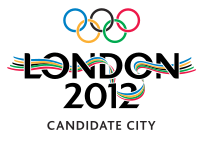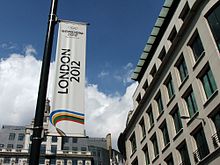
Back Candidatura de Londres a los Xuegos Olímpicos de 2012 AST Candidatura de Londres als Jocs Olímpics de 2012 Catalan Candidatura de Londres a los Juegos Olímpicos de 2012 Spanish
This article's factual accuracy may be compromised due to out-of-date information. (July 2012) |
| Overview | |
|---|---|
| Games of the XXX Olympiad XIV Paralympic Games | |
 | |
| Winner: London Runner-up: Paris Shortlist: Madrid · Moscow · New York City | |
| Details | |
| City | London, United Kingdom |
| NOC | British Olympic Association (BOA) |
| Evaluation | |
| IOC score | 7.6 |
| Previous Games hosted | |
| 1908 Summer Olympics 1948 Summer Olympics | |
| Decision | |
| Result | Defeated Paris in Round 4, 54–50 |
| Part of a series on |
| 2012 Summer Paralympics |
|---|
London 2012 was the successful bid to host the 2012 Summer Olympics, held in London with most events taking place in Stratford in the borough of Newham. The British Olympic Association had been working on the bid since 1997, and presented its report to government ministers in December 2000.
Following three consecutive unsuccessful UK bids to host summer Olympic Games (Birmingham for 1992 and Manchester for 1996 and 2000), the decision was made to bid with London, given the clear indication that it was the only UK city that had a chance of being selected by the International Olympic Committee (IOC) when put up against other world cities in a competitive bidding process.[1] On 6 July 2005 at its 117th Session in Singapore, the IOC awarded London the right to host the Games of the XXX Olympiad. The city beat the favourite Paris 54 to 50 on the fourth and final ballot. London is the first city to host the Games three times.[2]
At the time of the bid, the budget projection was around £2 billion, but it was later estimated that the true cost would be around £9 billion.[3] The project involved a major regeneration of the Stratford area of London, as well as improvements to surrounding services and associated venues.[1] Public transport, an aspect of the proposal which scored poorly for the bid, saw numerous improvements, including to the London Underground and the new "Olympic Javelin" service.[4]
The celebrations of the bid's success were partly silenced the day after the announcement when the 7 July 2005 London bombings killed 52 people and injured hundreds more. There was no confirmed link between the IOC decision and the attack,[5] which also coincided with the G8 Summit in Scotland.
Following the success of the bid, the London Organising Committee for the Olympic Games and Paralympic Games (LOCOG) was established to oversee the ongoing development of the games. Some alterations were made after the bid was accepted, including the decision by the IOC to eliminate some sporting events,[6] and a new layout for the Olympic Zone, both resulting in some relatively minor changes to the Olympic venues.

- ^ a b "Rivals for 2012: London". BBC Sport. 8 June 2005. Retrieved 6 March 2007.
- ^ "London wins 2012 Olympics". CNN. 7 July 2005. Archived from the original on 17 February 2007. Retrieved 6 March 2007.
- ^ "Experts debate Games bid benefits". BBC News. 6 March 2007. Retrieved 7 March 2007.
- ^ "Going for Gold: Transport for London's 2012 Olympic Games" (PDF). House of Commons Transport Committee. 14 March 2006. Retrieved 7 March 2007.
- ^ "IOC support after London attacks". BBC Sport. 8 July 2005. Retrieved 7 March 2007.
- ^ "New Olympic Programme in 2012". IOC. 8 July 2005. Retrieved 7 March 2007.